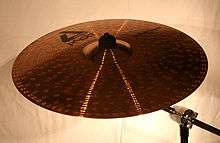cymbal
English
Etymology
From Middle English cymbal, from Old English cimbal, cimbala and Old French cimbale, both from Latin cymbalum (“cymbal”), from Ancient Greek κύμβαλον (kúmbalon), from κύμβη (kúmbē, “bowl”). See also chime.
Pronunciation
- IPA(key): /ˈsɪmbəl/, [ˈsɪmbəɫ]
Audio (US) (file) - Rhymes: -ɪmbəl
- Homophone: symbol
Noun

A cymbal on a stand.
cymbal (plural cymbals)
- (music) A concave plate of brass or bronze that produces a sharp, ringing sound when struck: played either in pairs, by striking them together, or singly by striking with a drumstick or the like.
- 1605–08, William Shakespeare, Coriolanus, Act V, sc. 3:
- The trumpets, sackbuts, psalteries and fifes,
- Tabours and cymbals and the shouting Romans,
- Make the sun dance.
- 1611, King James Version, 1 Corinthians 13:1:
- Though I speak with the tongues of men and of angels, and have not charity, I am become as sounding brass, or a tinkling cymbal.
- 1675, John Dryden, Aureng-zebe, Act V:
- Trumpets and Drums shall fright her from the Throne,
- As sounding Cymbals aid the lab'ring Moon.
- 1881–82, Walt Whitman, The Leaves of Grass, "The Mystic Trumpeter":
- I see the Crusaders' tumultuous armies—hark, how the cymbals clang ...
- 1605–08, William Shakespeare, Coriolanus, Act V, sc. 3:
Hyponyms
Derived terms
Translations
concave plate of brass or bronze that produces a sharp, ringing sound when struck
|
|
Swedish
Declension
| Declension of cymbal | ||||
|---|---|---|---|---|
| Singular | Plural | |||
| Indefinite | Definite | Indefinite | Definite | |
| Nominative | cymbal | cymbalen | cymbaler | cymbalerna |
| Genitive | cymbals | cymbalens | cymbalers | cymbalernas |
This article is issued from
Wiktionary.
The text is licensed under Creative
Commons - Attribution - Sharealike.
Additional terms may apply for the media files.